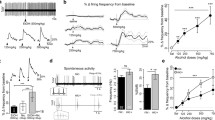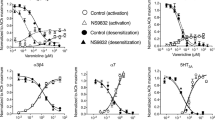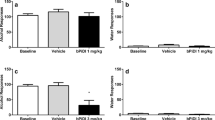Abstract
Rationale
Alcoholism is a serious public health problem throughout the world. Current pharmacotherapies for the treatment of this disorder are poorly effective. Preclinical and clinical findings point to nicotinic acetylcholine receptors (nAChRs) as a promising target for the development of novel and effective medications. Assuage Pharmaceuticals, in collaboration with Torrey Pines Institute for Molecular Studies, has discovered a new class of potent and selective α4β2 nAChR antagonists.
Objective
Here, it was hypothesized that α4β2 nAChR antagonism is a viable approach for treatment of alcohol use disorders.
Results
When tested in rats, one lead compound, AP-202, attenuated both operant alcohol and nicotine self-administration in a paradigm in which the two reinforcers were concurrently available. The conotoxin TP2212-59, a selective α3β4 nAChR antagonist, was only effective in reducing nicotine self-administration. AP-202 also reduced alcohol but not food responding when alcohol was presented as the only reinforcer, whereas the commercially available α4β2 nAChR antagonist dihydro-β-erythroidine failed to alter alcohol self-administration. AP-202 did not block relapse-like behavior induced by previously alcohol-associated stimuli or yohimbine stress. In a reinstatement paradigm, in which alcohol seeking was triggered by a nicotine challenge, a behavior successfully inhibited by the nonselective nAChR antagonist mecamylamine, AP-202 was not effective, while pretreatment with TP2212-59 abolished nicotine-induced reinstatement of alcohol seeking.
Conclusions
These findings suggest differential roles for α4β2 and α3β4 nAChR on alcohol taking and seeking with selective blockade of α4β2 nAChR being more implicated in modulating alcohol taking while selective blockade of α3β4 nAChR is involved in nicotine-induced alcohol seeking.





Similar content being viewed by others
References
Albuquerque EX, Pereira EF, Alkondon M, Rogers SW (2009) Mammalian nicotinic acetylcholine receptors: from structure to function. Physiol Rev 89:73–120
Ayanwuyi LO, Carvajal F, Lerma-Cabrera JM, Domi E, Bjork K, Ubaldi M, Heilig M, Roberto M, Ciccocioppo R, Cippitelli A (2013) Role of a genetic polymorphism in the corticotropin-releasing factor receptor 1 gene in alcohol drinking and seeking behaviors of marchigian sardinian alcohol-preferring rats. Frontiers Psychiatr 4:23
Bell RL, Eiler BJ 2nd, Cook JB, Rahman S (2009) Nicotinic receptor ligands reduce ethanol intake by high alcohol-drinking HAD-2 rats. Alcohol 43:581–592
Carroll FI (2004) Epibatidine structure-activity relationships. Bioorg Med Chem Lett 14:1889–1896
Carroll FI, Lee JR, Navarro HA, Ma W, Brieaddy LE, Abraham P, Damaj MI, Martin BR (2002) Synthesis, nicotinic acetylcholine receptor binding, and antinociceptive properties of 2-exo-2-(2′,3′-disubstituted 5′-pyridinyl)-7-azabicyclo[2.2.1]heptanes: epibatidine analogues. J Med Chem 45:4755–4761
Carroll FI, Ware R, Brieaddy LE, Navarro HA, Damaj MI, Martin BR (2004) Synthesis, nicotinic acetylcholine receptor binding, and antinociceptive properties of 2′-fluoro-3′-(substituted phenyl)deschloroepibatidine analogues. Novel nicotinic antagonist. J Med Chem 47:4588–4594
CDC (2014) Centers for Desease Control & Prevention. Alcohol-related disease impact (ARDI) application (2006–2010)
Chang YP, Banerjee J, Dowell C, Wu J, Gyanda R, Houghten RA, Toll L, McIntosh JM, Armishaw CJ (2014) Discovery of a potent and selective alpha3beta4 nicotinic acetylcholine receptor antagonist from an alpha-conotoxin synthetic combinatorial library. J Med Chem 57:3511–3521
Chatterjee S, Bartlett SE (2010) Neuronal nicotinic acetylcholine receptors as pharmacotherapeutic targets for the treatment of alcohol use disorders. CNS Neurol Disord Drug Targets 9:60–76
Chatterjee S, Steensland P, Simms JA, Holgate J, Coe JW, Hurst RS, Shaffer CL, Lowe J, Rollema H, Bartlett SE (2011) Partial agonists of the alpha3beta4* neuronal nicotinic acetylcholine receptor reduce ethanol consumption and seeking in rats. Neuropsychopharmacology 36:603–615
Ciccocioppo R, Angeletti S, Weiss F (2001) Long-lasting resistance to extinction of response reinstatement induced by ethanol-related stimuli: role of genetic ethanol preference. Alcohol Clin Exp Res 25:1414–1419
Cippitelli A, Damadzic R, Singley E, Thorsell A, Ciccocioppo R, Eskay RL, Heilig M (2012) Pharmacological blockade of corticotropin-releasing hormone receptor 1 (CRH1R) reduces voluntary consumption of high alcohol concentrations in non-dependent Wistar rats. Pharmacol Biochem Behav 100:522–529
Cippitelli A, Brunori G, Gaiolini KA, Zaveri NT, Toll L (2015a) Pharmacological stress is required for the anti-alcohol effect of the alpha3beta4* nAChR partial agonist AT-1001. Neuropharmacology 93:229–236
Cippitelli A, Wu J, Gaiolini KA, Mercatelli D, Schoch J, Gorman M, Ramirez A, Ciccocioppo R, Khroyan TV, Yasuda D, Zaveri NT, Pascual C, Xie XS, Toll L (2015b) AT-1001: a high-affinity alpha3beta4 nAChR ligand with novel nicotine-suppressive pharmacology. Br J Pharmacol 172:1834–1845
Cippitelli A, Schoch J, Debevec G, Brunori G, Zaveri NT, Toll L (2016) A key role for the N/OFQ-NOP receptor system in modulating nicotine taking in a model of nicotine and alcohol co-administration. Sci Rep 6:26594
Doyon WM, Dong Y, Ostroumov A, Thomas AM, Zhang TA, Dani JA (2013) Nicotine decreases ethanol-induced dopamine signaling and increases self-administration via stress hormones. Neuron 79:530–540
Ericson M, Blomqvist O, Engel JA, Soderpalm B (1998) Voluntary ethanol intake in the rat and the associated accumbal dopamine overflow are blocked by ventral tegmental mecamylamine. Eur J Pharmacol 358:189–196
Erwin BL, Slaton RM (2014) Varenicline in the treatment of alcohol use disorders. Ann Pharmacother 48:1445–1455
Gaimarri A, Moretti M, Riganti L, Zanardi A, Clementi F, Gotti C (2007) Regulation of neuronal nicotinic receptor traffic and expression. Brain Res Rev 55:134–143
Gallego X, Ruiz-Medina J, Valverde O, Molas S, Robles N, Sabria J, Crabbe JC, Dierssen M (2012) Transgenic over expression of nicotinic receptor alpha 5, alpha 3, and beta 4 subunit genes reduces ethanol intake in mice. Alcohol 46:205–215
Gotti C, Zoli M, Clementi F (2006) Brain nicotinic acetylcholine receptors: native subtypes and their relevance. Trends Pharmacol Sci 27:482–491
Hendrickson LM, Zhao-Shea R, Tapper AR (2009) Modulation of ethanol drinking-in-the-dark by mecamylamine and nicotinic acetylcholine receptor agonists in C57BL/6J mice. Psychopharmacology 204:563–572
Hendrickson LM, Zhao-Shea R, Pang X, Gardner PD, Tapper AR (2010) Activation of alpha4* nAChRs is necessary and sufficient for varenicline-induced reduction of alcohol consumption. J Neurosci 30:10169–10176
Hendrickson LM, Guildford MJ, Tapper AR (2013) Neuronal nicotinic acetylcholine receptors: common molecular substrates of nicotine and alcohol dependence. Frontiers Psychiatr 4:29
Jorenby DE, Hays JT, Rigotti NA, Azoulay S, Watsky EJ, Williams KE, Billing CB, Gong J, Reeves KR (2006) Efficacy of varenicline, an alpha4beta2 nicotinic acetylcholine receptor partial agonist, vs placebo or sustained-release bupropion for smoking cessation: a randomized controlled trial. JAMA 296:56–63
Kamens HM, Andersen J, Picciotto MR (2010) Modulation of ethanol consumption by genetic and pharmacological manipulation of nicotinic acetylcholine receptors in mice. Psychopharmacology 208:613–626
Lacroix F, Pettorelli A, Maddux JN, Heidari-Jam A, Chaudhri N (2017) Varenicline reduces context-induced relapse to alcohol-seeking through actions in the nucleus Accumbens. Neuropsychopharmacolgy 42:1037–1048
Le AD, Corrigall WA, Harding JW, Juzytsch W, Li TK (2000) Involvement of nicotinic receptors in alcohol self-administration. Alcohol Clin Exp Res 24:155–163
Le AD, Wang A, Harding S, Juzytsch W, Shaham Y (2003) Nicotine increases alcohol self-administration and reinstates alcohol seeking in rats. Psychopharmacology 168:216–221
Le AD, Lo S, Harding S, Juzytsch W, Marinelli PW, Funk D (2010) Coadministration of intravenous nicotine and oral alcohol in rats. Psychopharmacology 208:475–486
Liu X, Caggiula AR, Yee SK, Nobuta H, Sved AF, Pechnick RN, Poland RE (2007) Mecamylamine attenuates cue-induced reinstatement of nicotine-seeking behavior in rats. Neuropsychopharmacology 32:710–718
Marks MJ, Whiteaker P, Calcaterra J, Stitzel JA, Bullock AE, Grady SR, Picciotto MR, Changeux JP, Collins AC (1999) Two pharmacologically distinct components of nicotinic receptor-mediated rubidium efflux in mouse brain require the beta2 subunit. J Pharmacol Exp Ther 289:1090–1103
McKee SA, Harrison EL, O’Malley SS, Krishnan-Sarin S, Shi J, Tetrault JM, Picciotto MR, Petrakis IL, Estevez N, Balchunas E (2009) Varenicline reduces alcohol self-administration in heavy-drinking smokers. Biol Psychiatry 66:185–190
NHTSA (2016) National Highway Traffic Safety Administration. 2015 motor vehicle crashes: Overview
Ouagazzal AM, Kenny PJ, File SE (1999) Modulation of behaviour on trials 1 and 2 in the elevated plus-maze test of anxiety after systemic and hippocampal administration of nicotine. Psychopharmacology 144:54–60
Patkar OL, Belmer A, Tarren JR, Holgate JY, Bartlett SE (2016) The effect of varenicline on binge-like ethanol consumption in mice is beta4 nicotinic acetylcholine receptor-independent. Neurosci Lett 633:235–239
Perry DC, Xiao Y, Nguyen HN, Musachio JL, Davila-Garcia MI, Kellar KJ (2002) Measuring nicotinic receptors with characteristics of alpha4beta2, alpha3beta2 and alpha3beta4 subtypes in rat tissues by autoradiography. J Neurochem 82:468–481
Petrakis IL, Ralevski E, Gueorguieva R, O’Malley SS, Arias A, Sevarino KA, Jane JS, O’Brien E, Krystal JH (2018) Mecamylamine treatment for alcohol dependence: a randomized controlled trial. Addiction 113(1):6–14
Rahman S, Engleman EA, Bell RL (2014) Nicotinic receptor modulation to treat alcohol and drug dependence. Front Neurosci 8:426
Rezvani AH, Slade S, Wells C, Petro A, Lumeng L, Li TK, Xiao Y, Brown ML, Paige MA, McDowell BE, Rose JE, Kellar KJ, Levin ED (2010) Effects of sazetidine-A, a selective alpha4beta2 nicotinic acetylcholine receptor desensitizing agent on alcohol and nicotine self-administration in selectively bred alcohol-preferring (P) rats. Psychopharmacology 211:161–174
Rollema H, Chambers LK, Coe JW, Glowa J, Hurst RS, Lebel LA, Lu Y, Mansbach RS, Mather RJ, Rovetti CC, Sands SB, Schaeffer E, Schulz DW, Tingley FD 3rd, Williams KE (2007) Pharmacological profile of the alpha4beta2 nicotinic acetylcholine receptor partial agonist varenicline, an effective smoking cessation aid. Neuropharmacology 52:985–994
Sacks JJ, Gonzales KR, Bouchery EE, Tomedi LE, Brewer RD (2015) 2010 National and state costs of excessive alcohol consumption. Am J Prev Med 49:e73–e79
Sajja RK, Rahman S (2013) Nicotinic receptor partial agonists modulate alcohol deprivation effect in C57BL/6J mice. Pharmacol Biochem Behav 110:161–167
Scuppa G, Cippitelli A, Toll L, Ciccocioppo R, Ubaldi M (2015) Varenicline decreases nicotine but not alcohol self-administration in genetically selected Marchigian Sardinian alcohol-preferring (msP) rats. Drug Alcohol Depend 156:126–132
Srisontiyakul J, Kastman HE, Krstew EV, Govitrapong P, Lawrence AJ (2016) The nicotinic alpha6-subunit selective antagonist bPiDI reduces alcohol self-administration in alcohol-preferring rats. Neurochem Res 41:3206–3214
Stahre M, Roeber J, Kanny D, Brewer RD, Zhang X (2014) Contribution of excessive alcohol consumption to deaths and years of potential life lost in the United States. Prev Chronic Dis 11:E109
Steensland P, Simms JA, Holgate J, Richards JK, Bartlett SE (2007) Varenicline, an alpha4beta2 nicotinic acetylcholine receptor partial agonist, selectively decreases ethanol consumption and seeking. Proc Natl Acad Sci U S A 104:12518–12523
Substance Abuse and Mental Health Services Administration (SAMHSA) (2013) National Survey on Drug Use and Health (NSDUH). Table 5.8B—Substance Dependence or Abuse in the Past Year among Persons Aged 18 or Older, by Demographic Characteristics: Percentages, 2012 and 2013. Available at: http://www.samhsa.gov/data/sites/default/files/NSDUH-DetTabsPDFWHTML2013/Web/HTML/NSDUH-DetTabsSect5peTabs1to56-2013.htm#tab5.8b
Tapper AR, McKinney SL, Nashmi R, Schwarz J, Deshpande P, Labarca C, Whiteaker P, Marks MJ, Collins AC, Lester HA (2004) Nicotine activation of alpha4* receptors: sufficient for reward, tolerance, and sensitization. Science 306:1029–1032
Toll L, Zaveri NT, Polgar WE, Jiang F, Khroyan TV, Zhou W, Xie XS, Stauber GB, Costello MR, Leslie FM (2012) AT-1001: a high affinity and selective alpha3beta4 nicotinic acetylcholine receptor antagonist blocks nicotine self-administration in rats. Neuropsychopharmacology 37:1367–1376
Volkow ND, Skolnick P (2012) New medications for substance use disorders: challenges and opportunities. Neuropsychopharmacology 37:290–292
Wouda JA, Riga D, De Vries W, Stegeman M, van Mourik Y, Schetters D, Schoffelmeer AN, Pattij T, De Vries TJ (2011) Varenicline attenuates cue-induced relapse to alcohol, but not nicotine seeking, while reducing inhibitory response control. Psychopharmacology 216:267–277
Wu J, Zhang Y, Maida LE, Santos RG, Welmaker GS, LaVoi TM, Nefzi A, Yu Y, Houghten RA, Toll L, Giulianotti MA (2013) Scaffold ranking and positional scanning utilized in the discovery of nAChR-selective compounds suitable for optimization studies. J Med Chem 56:10103–10117
Wu J, Cippitelli A, Zhang Y, Debevec G, Schoch J, Ozawa A, Yu Y, Liu H, Chen W, Houghten RA, Welmaker GS, Giulianotti MA, Toll L (2017) Highly selective and potent alpha4beta2 nAChR antagonist inhibits nicotine self-administration and reinstatement in rats. J Med Chem 60:10092–10104
Xiao Y, Kellar KJ (2004) The comparative pharmacology and up-regulation of rat neuronal nicotinic receptor subtype binding sites stably expressed in transfected mammalian cells. J Pharmacol Exp Ther 310:98–107
Xiao Y, Fan H, Musachio JL, Wei ZL, Chellappan SK, Kozikowski AP, Kellar KJ (2006) Sazetidine-A, a novel ligand that desensitizes alpha4beta2 nicotinic acetylcholine receptors without activating them. Mol Pharmacol 70:1454–1460
Zaveri NT, Bertrand S, Yasuda D, Bertrand D (2015) Functional characterization of AT-1001, an alpha3beta4 nicotinic acetylcholine receptor ligand, at human alpha3beta4 and alpha4beta2 nAChR. Nicotine Tob Res 17:361–367
Zhao-Shea R, DeGroot SR, Liu L, Vallaster M, Pang X, Su Q, Gao G, Rando OJ, Martin GE, George O, Gardner PD, Tapper AR (2015) Increased CRF signalling in a ventral tegmental area-interpeduncular nucleus-medial habenula circuit induces anxiety during nicotine withdrawal. Nat Commun 6:6770
Acknowledgements
We are thankful to Shannon Ortiz-Umpierre and Roman Ramirez for animal care and Ginamarie Debevec for support in analytical chemistry.
Funding
This work was supported by NIH grants R41 AA025298 and R44 DA036968.
Author information
Authors and Affiliations
Corresponding author
Ethics declarations
Conflict of interest
The authors declare that they have no conflict of interest.
Additional information
Christopher J. Armishaw’s current affiliation is with Eli Lilly & Company, Indianapolis, IN 46285.
Rights and permissions
About this article
Cite this article
Cippitelli, A., Brunori, G., Schoch, J. et al. Differential regulation of alcohol taking and seeking by antagonism at α4β2 and α3β4 nAChRs. Psychopharmacology 235, 1745–1757 (2018). https://doi.org/10.1007/s00213-018-4883-y
Received:
Accepted:
Published:
Issue Date:
DOI: https://doi.org/10.1007/s00213-018-4883-y




